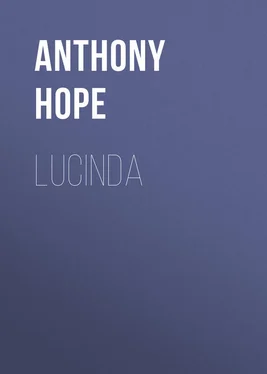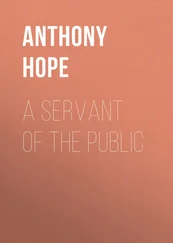Anthony Hope - Lucinda
Здесь есть возможность читать онлайн «Anthony Hope - Lucinda» — ознакомительный отрывок электронной книги совершенно бесплатно, а после прочтения отрывка купить полную версию. В некоторых случаях можно слушать аудио, скачать через торрент в формате fb2 и присутствует краткое содержание. Жанр: foreign_prose, на английском языке. Описание произведения, (предисловие) а так же отзывы посетителей доступны на портале библиотеки ЛибКат.
- Название:Lucinda
- Автор:
- Жанр:
- Год:неизвестен
- ISBN:нет данных
- Рейтинг книги:3 / 5. Голосов: 1
-
Избранное:Добавить в избранное
- Отзывы:
-
Ваша оценка:
- 60
- 1
- 2
- 3
- 4
- 5
Lucinda: краткое содержание, описание и аннотация
Предлагаем к чтению аннотацию, описание, краткое содержание или предисловие (зависит от того, что написал сам автор книги «Lucinda»). Если вы не нашли необходимую информацию о книге — напишите в комментариях, мы постараемся отыскать её.
Lucinda — читать онлайн ознакомительный отрывок
Ниже представлен текст книги, разбитый по страницам. Система сохранения места последней прочитанной страницы, позволяет с удобством читать онлайн бесплатно книгу «Lucinda», без необходимости каждый раз заново искать на чём Вы остановились. Поставьте закладку, и сможете в любой момент перейти на страницу, на которой закончили чтение.
Интервал:
Закладка:
How did this view look now – in the light of recent events? Was there any reason to associate the old quarrel of 1912 with the catastrophe which had now befallen Waldo? I had an impulse to put these questions to Aunt Bertha, perhaps to Sir Paget too. But, on reflection, I kept my thoughts to myself. Silence was the mot d’ordre ; Waldo himself had set the example.
It was on the Saturday – the day on which the question of Belgian neutrality defined itself, according to my uncle’s information, as the vital point – that, wearied by a long talk about it and oppressed by Waldo’s melancholy silence, I set out for a walk by myself. Cragsfoot, our family home, lies by the sea, on the north coast of Devon; a cleft in the high cliffs just leaves room for the old gray stone house and its modest demesne; a steep road leads up to the main highway that runs along the top of the cliff from east to west. I walked up briskly, not pausing till I reached the top, and turned to look at the sea. I stood there, taking in the scene and snuffing in the breeze. A sudden wave of impatient protest swept over my mind. Wars and rumors of wars – love and its tragedies – troubles public and private! My holiday was being completely spoilt. A very small and selfish point of view, no doubt, but human, after all.
“Oh, damn the whole thing!” I exclaimed aloud.
It must have been aloud – though I was not conscious that it was – for another audible voice spoke in response.
“That’s just what Father said this morning!”
“It’s just what everybody’s saying,” I groaned. “But – well, how are you after all this time, Miss Frost?”
For it was Nina Frost who stood beside me and I felt oddly surprised that, in my retrospect of that earlier summer at Cragsfoot, I had never thought of her; because she had been a good deal with us in our sports and excursions. But the plain fact is that there had been little about her in those days that would catch a mature man’s attention or dwell in his memory. She was a chit of a girl, a couple of years or so younger than Lucinda, much more the school-girl, pretty enough but rather insignificant, attaching herself to the other three rather by her own perseverance than thanks to any urgent pressing on their part. Lucinda had altogether outshone her in the eyes of us all; she had been “little Nina Frost from Briarmount.”
But now – she was different. A first glance showed that. She was not only taller, with more presence; she had acquired not merely an ease of manner; it was a composure which was quite mature, and might almost be called commanding.
“You’ve changed!” I found myself exclaiming.
“Girls do – between sixteen and eighteen – or nearly nineteen! Haven’t you noticed it, Mr. Rillington?” She smiled. “Hasn’t Lucinda changed too? I expect so! Oh, but you’ve been abroad, haven’t you? And since she didn’t – I mean, since the wedding didn’t – Oh, well, anyhow, perhaps you haven’t seen her?”
“No, I haven’t seen her.” I had not – officially. “Are you going towards Briarmount? May I walk with you?”
“Yes, do. And perhaps I haven’t changed so much, after all. You see, you never took much notice of me. Like the others, you were dazzled by Lucinda. Are you at liberty to tell me anything, Mr. Rillington? If you aren’t, I won’t ask.”
She implied that she was not much changed. But would any child of sixteen put it like that? I thought it precocious for eighteen; for it cornered me. I had to lie, or admit practically the whole thing. I tried to fence.
“But didn’t you go to the wedding yourself?” I asked. “If you did – ”
“No, I didn’t. Father wasn’t very well, and I had to stay down with him.”
As we walked, I had been slyly studying her face: she had grown handsome in a style that was bold and challenging, yet in no way coarse; in fact, she was very handsome. As she gave me her most respectable reason for not having attended – or attempted to attend – Waldo’s wedding, she grew just a little red. Well, she was still only eighteen; her education, though I remained of opinion that it had progressed wonderfully, was not complete. She was still liable to grow red when she told fibs. But why was she telling a fib?
She recovered her composure quickly and turned to me with a rather sharp but not unpleasant little laugh. “As it turned out, I’m glad. It must have been a very uncomfortable occasion.” She laughed again – obviously at me. “Come, Mr. Rillington, be sensible. There are servants at Cragsfoot. And there are servants at Briarmount. Do you suppose that I haven’t heard all the gossip through my maid? Of course I have! And can’t I put two and two together?”
I had never – we had never – thought of this obvious thing. We had thought that we could play the ostrich with its head in the sand! Our faithful retainers were too keen-sighted for that!
“Besides,” she pursued, “when smart society weddings have to be put off, because the bride doesn’t turn up at the last moment, some explanation is put in the papers – if there is an explanation. And she gets better or worse! She doesn’t just vanish, does she, Mr. Rillington?”
I made no reply; I had not one ready.
“Oh, it’s no business of mine. Only – I’m sorry for Waldo, and dear Miss Fleming.” A gesture of her neatly gloved and shapely hands seemed to dismiss the topic with a sigh. “Have you seen anything of Don Arsenio lately?” she asked the next moment. “Is he in England?”
“Yes. He was at the wedding – well, at the church, I mean.”
She came to a stop, turning her face full round to me; her lips were parted in surprise, her white teeth just showing; her eyes seemed full of questions. If she had “scored off” me, at least I had startled her that time. “Was he?” she murmured.
At the point to which our walk had now brought us, the cliffs take a great bulge outwards, forming a bold rounded bluff. Here, seeming to dominate, to domineer over, a submissive Bristol Channel, Mr. Jonathan Frost (as he then was – that is, I think, the formula) had built his country seat; and “Briarmount” he had called it.
“Good Heavens,” said I, “what’s happened to the place? It’s grown! It’s grown as much as you have!”
“We’ve built on a bit – a few more bedrooms, and bathrooms. And garages, you know. Oh, and a ballroom!”
“No more than that?”
“Not at present. Come in and have a look – and some tea. Or are you in too deep mourning?”
I found myself not exactly liking the girl, but interested in her, in her composure – and her impudence. I accepted her invitation.
Since he could very well afford it, no blame need rest on Mr. Frost for building himself a large house and equipping it sumptuously. The only thing was that, when he had got it, he did not seem to care a bit about it. Probably he built it to please Nina – or to enshrine Nina; no doubt he found in his daughter a partial and agreeable solution of the difficulty of how to spend the money which he could not help making. He himself was a man of the simplest ways and tastes – almost of no tastes at all. He did not even drink tea; while we took ours, he consumed a small bowlful of one of those stuffs which, I believe, they call cereals – this is a large domed hall of glass – conservatory, winter-garden, whatever it should be called – full of exotic plants and opening on a haughty terrace with a view of the sea. He was small, slight, shabby, simple, and rather nervous. Still I gazed on him with some awe; he was portentously rich; Mother Earth labored, and her children sweated, at his bidding; he waved wands, and wildernesses became – no, not quite paradises perhaps, but at all events garden-cities; he moved mountains and where the ocean had been he made dry land. Surely it beseems us to look with some awe on a man like that? I, at least, being more or less in the same line of business, recognized in him a master.
Читать дальшеИнтервал:
Закладка:
Похожие книги на «Lucinda»
Представляем Вашему вниманию похожие книги на «Lucinda» списком для выбора. Мы отобрали схожую по названию и смыслу литературу в надежде предоставить читателям больше вариантов отыскать новые, интересные, ещё непрочитанные произведения.
Обсуждение, отзывы о книге «Lucinda» и просто собственные мнения читателей. Оставьте ваши комментарии, напишите, что Вы думаете о произведении, его смысле или главных героях. Укажите что конкретно понравилось, а что нет, и почему Вы так считаете.












